How Many Hours Should A Newborn Sleep pattern

Last updated on September 12th, 2022 at 11:46 pm
How many hours should a newborn sleep? This is a question that has been asked by parents for years. The amount of sleep that newborn needs vary, but most newborns need around 16-18 hours of sleep a day.
Many factors determine how much sleep a newborn is taking. Some of these factors include the baby’s age, weight, and feeding schedule.
There are few discrete schools of thought on the internet in terms of total sleeping hours. Some say newborns sleep for 12 to 15 hours and some 16 to 18 hours per 24 hours a day.
These complex numbers lead to creating confusion among the readers they remain daunted whether which info is authentic, the thing is it doesn’t matter if your baby sleep 1 or 2 hours more or less than the given info because all these number or stats are for giving you just an idea,
To solve this confusion here is a concurrence statement for recommended sleep amount for your baby.
How many hours should a newborn sleep during the day
It is often recommended that newborns sleep for sixteen hours a day. This may seem like a lot, but newborns must get plenty of sleep to help them grow and develop. There are many benefits to newborns getting plenty of sleep.
For one, newborns who get enough sleep are less likely to become sick. Additionally, newborns who get enough sleep are more likely to breastfeed successfully. Finally, getting enough sleep helps newborns learn and remember new things.
how important sleep is for newborns
Sleep is crucial for newborns because it
- helps them grow and develop.
- It helps to weight gain.
- It also gives their systems a chance to rest and recharge.
- It boosts their immune system.
Lack of sleep can cause problems with growth, development, and health. Studies have shown that newborns who get enough sleep are more likely to breastfeed successfully, gain weight appropriately, and cry less than those who don’t get enough sleep.
How much sleep does a newborn need?
A newborn baby should sleep between 16 and 18 hours each day, according to the National Sleep Foundation. Infants younger than 6 months should sleep for longer periods throughout the day, while babies 6 to 12 months old generally need only one nap during the day.
How to handle problems with sleep
Sleep deprivation is one of the most common problems parents face when their newborns won’t sleep. It can be frustrating and exhausting, and it’s hard to know how to get out of it. Here are a few tips:
-Get as much rest as you can. When you’re tired, you’re more likely to become frustrated and angry.
-Talk to your doctor about your baby’s sleep habits. He or she may be able to offer some advice or suggest a sleep specialist.
-Establish a bedtime routine for your baby and stick to it as closely as possible. This can help your baby learn how to fall asleep on his or her own.
-Create a calm and relaxing environment in your home. Avoid bright lights, loud noises, and stimulating activities in the hours before bedtime.
One-year sleep schedule of the newborn
| AGE in Months | TOTAL HOURS | NAPS | DAYTIME HOURS | Night sleep Characteristics |
| 0 to 2 | 14-17 | 4 to 5 | 7 to 8 | Feed interval after every 2 to 3 hours |
| 3 to 5 | 14-16 | 4 to 3 | 4 to 6 | Longer night sleeping hours |
| 6 to 8 | 14 | 2 to 3 | 3 to 4 | Night Sleep regression |
| 9 to 12 | 14 | 2 | 3 to 4 | Longer sleeping hours |
0 to 2 months
Coming home from the hospital with your newborn is too exciting for new parents but soon you realize that the only thing that is dear to your neonate is sleep, sleep, and sleep. Generally, from birth to two months of age newborns sleep for 14 to 17 hours divided into 2 to 3 hourly breaks for feeding.
Hence, these small fragments are going to come in many different installments focused on cycles of feed, poop, and sleep repeat. Every two to three hours means that you will be awake most of the night, too.
Most of the breastfed newborns and formula-fed as well have too much sense for their feeding time. You don’t need to wake them up for feed as their belly alarm is pretty much accurate in its job.
An initial couple of weeks are supremely important to follow the strict feeding routine for the newborns, for getting back the indigenous weight.
3 to 5 months:
After spending hectic two months with your newborn, softly you will get realize that your baby is more active and alert during the day, your little one wants more interaction with you now is the time when the baby’s nap transition starts.
At this age, babies sleep for an average of 14 to 16 hours, daytime naps decreased up to 4 to 3 naps but longer sleeping hours in the night. The weaning diet is started at 4 to 6 months of age as per most the Pediatrician leading to fuller stomachs now as compared to the early 3 months promotes long sleep at the night.
6 to 8 months
At this phase, infants sleep an average of 14 hours, with 2 to 3 naps in the day that consists of almost 3 to 4 hours. As a matter of fact, sleep regression is also noticed because of the stranger anxiety in this age group. Sudden night awakening and crying for no reason are also common.
Parents got confused and worried in this situation sometimes rush to the hospital to us, but when they reach the Emergency Room, the child is found in a comfortable state even parents are surprised.
This tinny creature is a mystery you realize day by day.
9 to 12 months
The number of hours remains almost the same at 14 hours, regardless of night stretches up to 12 hours, By the passage of time when baby is going to blow the candle, day naps also shrink to 2 naps only that is a total of 3 to 4 hours per day.
Factors that impact the sleep schedule:
Birth :
Full-term or preterm birth also determines the sleep pattern of your baby. If your baby is prematurely born his/her sleeping hours are extended than the full-term baby they may sleep for 20 to 22 hours as per their age maturity. They are more responsive to feed.
Preemies take longer for achieving sleep milestones [longer sleep hours, nap transition ] in contrast to mature babies.
Feed :
Babies on a formula feed tend to sleep longer hours because it takes time to digest, yet breastfed get hungry more frequently as it is easy to digest. However, ladies, there is no blueprint for rapid falling asleep. Eventually, both feeding methods work the same.
Final verdict:
At the end of the post, I hope you just get an idea about how many hours should a newborn sleep, usually Newborns sleep from 16 to 18 in 24 hours.
Children’s sleep hours must differ from each other hence some co-related factors do matter in the healthy sleeping habits of a newborn for example age, weight, and feeding routine.
Gradually you get to understand their routine and get used to it, remember don’t compare your child in any aspect to others, because every child is different.






